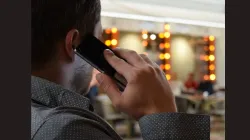Call forwarded scam: What is it and how is government protecting the users
Hackers have started using the call forward feature to scam people and witnessing the rising complaints, the government of India has come up with preventive measures to safeguard the telecom users.

The Indian government has been taking a proactive step to address the rising issue of call-forwarding scams. The government has decided to suspend the feature temporarily for millions of smartphone users across India. The Department of Telecommunications (DoT) further issued a circular in March 2024 where they instructed telecom companies to cease supporting the USSD-based call forwarding service as it has been exploiting the common man by scammers for fraudulent activities.
The reason behind suspending the service
The decision to suspend the call forwarding feature has been taken into consideration because scammers are misusing the feature to commit fraud online and steal money from unsuspecting individuals' bank accounts.
Although the call forwarding feature is typically a useful feature which lets the user redirect calls to another number under certain circumstances. This feature has become a tool for malicious actors to exploit vulnerabilities.
Discontinuation of USSD-based call forwarding service: Reason
As per the DoT circular, the USSD-based call forwarding service will discontinue its service across the nation from April 15, 2024. Users who have relied on this feature for call forwarding will need to explore alternative methods, as the USSD-centric service will no longer be operational.
Understanding USSD codes and scam process
USSD codes consist of alphanumeric characters and special symbols like "*" and "#", and it is commonly used on both features and smartphones to access telecom-related services and perform tasks such as UPI payments.
Scammers have been initiating call-forwarding scams by posing as internet providers or telecom operators, which has induced panic among victims by claiming their mobile accounts have been hacked or their SIM cards have been compromised.
Call forwarding scams: How the scammers execute it?
To execute call call-forwarded scams, hackers tend to prompt victims to dial a specific USSD code, like *401#, which will purportedly activate call forwarding. This will grant the scammer unauthorized access to the victim's phone calls and text messages, as per the sensitive information like OTPs for bank transactions.
How to counter such scams?
To counter these kinds of scams, individuals can use the USSD code *#21# to check if their calls or phone numbers are ‘forwarded’ to another number or not.
Preventive measures
To avoid being the victim of call-forwarding scams, people are suggested to respond to calls purportedly from their telco's customer service request.
ALSO READ: How to unlock the Google Gemini potential for YouTube videos?
